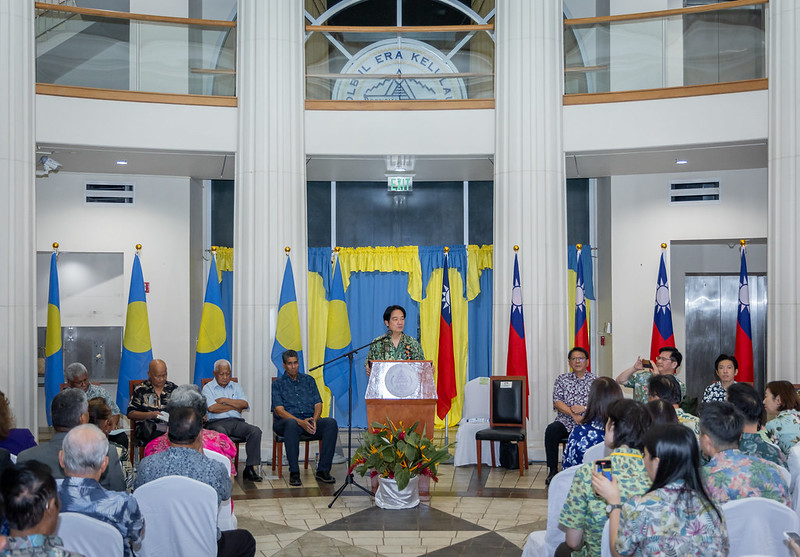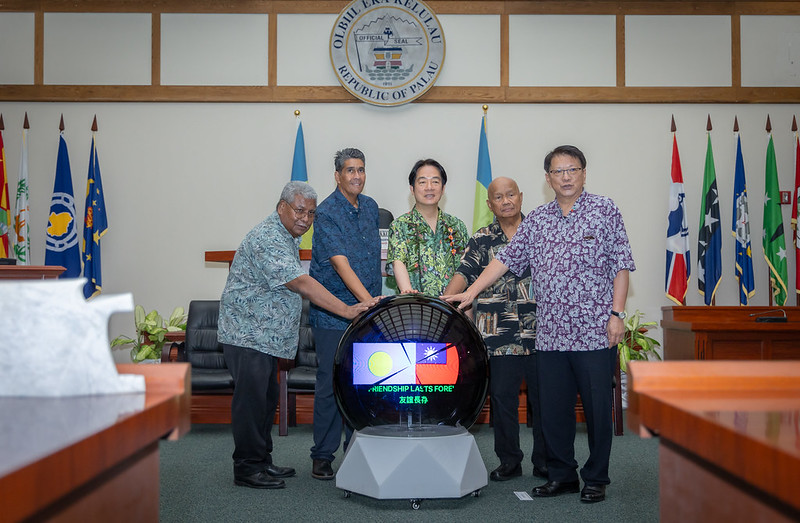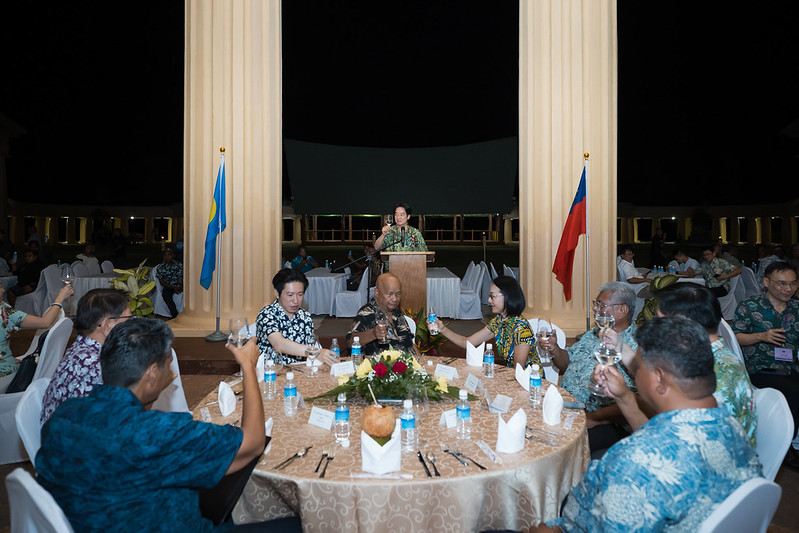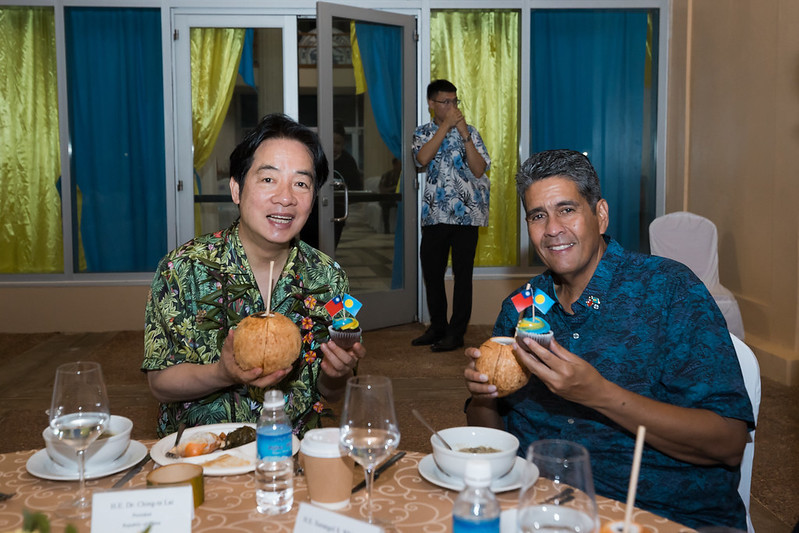News & activities
 News releases
News releases
On the evening of December 5 local time (earlier in the evening of December 5 Taipei time), President Lai Ching-te addressed the National Congress of the Republic of Palau as part of his itinerary for state visits to the Marshall Islands, Tuvalu, and the Republic of Palau. In remarks, President Lai thanked Palau for its support for Taiwan, enabling Taiwan to make even more contributions to promoting public health, addressing climate change, improving flight safety, combating transnational crime, and other areas. He expressed hope that Taiwan and Palau will continue to work hand in hand, jointly showing the world that Taiwan and Palau will make even more contributions to global democracy, peace, and prosperity.
A translation of President Lai’s remarks follows:
Two years ago, I had the pleasure of visiting the Republic of Palau as vice president. I extend my thanks to President Surangel S. Whipps, Jr. and all parts of Palauan society for their warm welcome. I missed Palau’s beautiful scenery, especially the very colorful ecology of the blue ocean around the island.
I have been looking forward to returning to Palau, and I would like to thank President Whipps, Senate President Hokkons Baules, and House Speaker Sabino Anastacio for the invitation. This has allowed me to once again enjoy Palau’s sunshine, beaches, and ocean, as well as the generous hospitality of its people. And, once again, I have the chance to meet with you under the dome of the congress.
This year marks the 30th anniversary of Palau’s independence. We are also celebrating 25 years of diplomatic ties between the Republic of China (Taiwan) and Palau. Our countries are home to Austronesian peoples, who share a common heritage and culture. And in our respective lands, we have both built democratic and prosperous societies. Gathered here today, we can testify to the tireless efforts of Taiwan and Palau in the struggle for freedom, democracy, and human rights. The Palauan people went bravely forward, going through eight referenda before the Republic of Palau was finally established. And Taiwan, on its path, experienced authoritarian rule before the sacrifices of a succession of democracy activists and the collective struggle of all Taiwan’s people helped establish democratic governance.
Taiwan and Palau are both important bastions of democracy against authoritarian expansionism. By sharing our experiences in such fields as climate change, education, industry, and tourism, we have improved the welfare of our peoples, made their lives easier, and promoted national prosperity. Taiwan and Palau share an Austronesian cultural heritage; we are a family, and we both pursue the belief in freedom and democracy.
I am sure everyone remembers 2020, when an unprecedented pandemic brought the world to a halt. Yet, Taiwan and Palau remained united. Taiwan donated disease prevention supplies to Palau. The following year, Palau and Taiwan launched a travel bubble. We jointly created a safe model for travel and allowed Taiwanese tourists to visit Palau. The initiative was a model of collaboration between democracies in combating the pandemic.
I would also like to thank Palau’s National Congress for its longstanding support for Taiwan’s international participation. This March, Palauan lawmakers at the general assembly of the Asian-Pacific Parliamentarians’ Union backed Taiwan’s participation in COP29. Palau’s support has enabled Taiwan to make even more contributions to promoting public health, addressing climate change, improving flight safety, combating transnational crime, and other areas, helping Taiwan engage with the world, and the world embrace Taiwan.
In recent years, the whole world has faced the challenge of transitioning to smart technologies. In my inaugural address, I raised the issue of making a smarter and more sustainable Taiwan. Now, Palau is pushing ahead with national digital transformation, starting with digitalization of the National Congress. Minutes from now at the Senate, we will jointly launch a National Congress digital transformation project. Moving forward, Taiwan and Palau will cooperate to upgrade the congress building’s audiovisual facilities and data protection. An electronic voting system will also be installed to streamline legislative work and make it more accessible to the public. This will further deepen democratic governance in Palau. I hope this cooperative project will set the standard for digitalization and smart technology transformation in the South Pacific as well as promote progress and prosperity for both Taiwan and Palau.
I see many familiar faces here today, including some of the legislators who traveled with President Whipps and the first lady to Taiwan in May. I look forward to the president and legislators continuing to lead delegations to Taiwan to advance exchanges and cooperation and deepen the diplomatic ties between our two countries.
Lastly, I again want to thank the people, government, and National Congress of Palau for their assistance and support for Taiwan. Over the past quarter of a century, Taiwan and Palau have achieved much together. I look forward to continuing to work hand in hand. Let us jointly show the world that through collective efforts, Taiwan and Palau will uphold the values of freedom and democracy and make even more contributions to global democracy, peace, and prosperity.
Following his remarks, President Lai attended a launch ceremony for an information system at the Palau National Congress in which he and President Whipps, House Speaker Anastacio, Senate Vice President Kerai Mariur, and Secretary-General to the President Pan Men-an (潘孟安) took part, marking the official initiation of the system. In the evening, President Lai attended a state banquet hosted by President Whipps, where they enjoyed lively conversation in a relaxed and friendly atmosphere.












